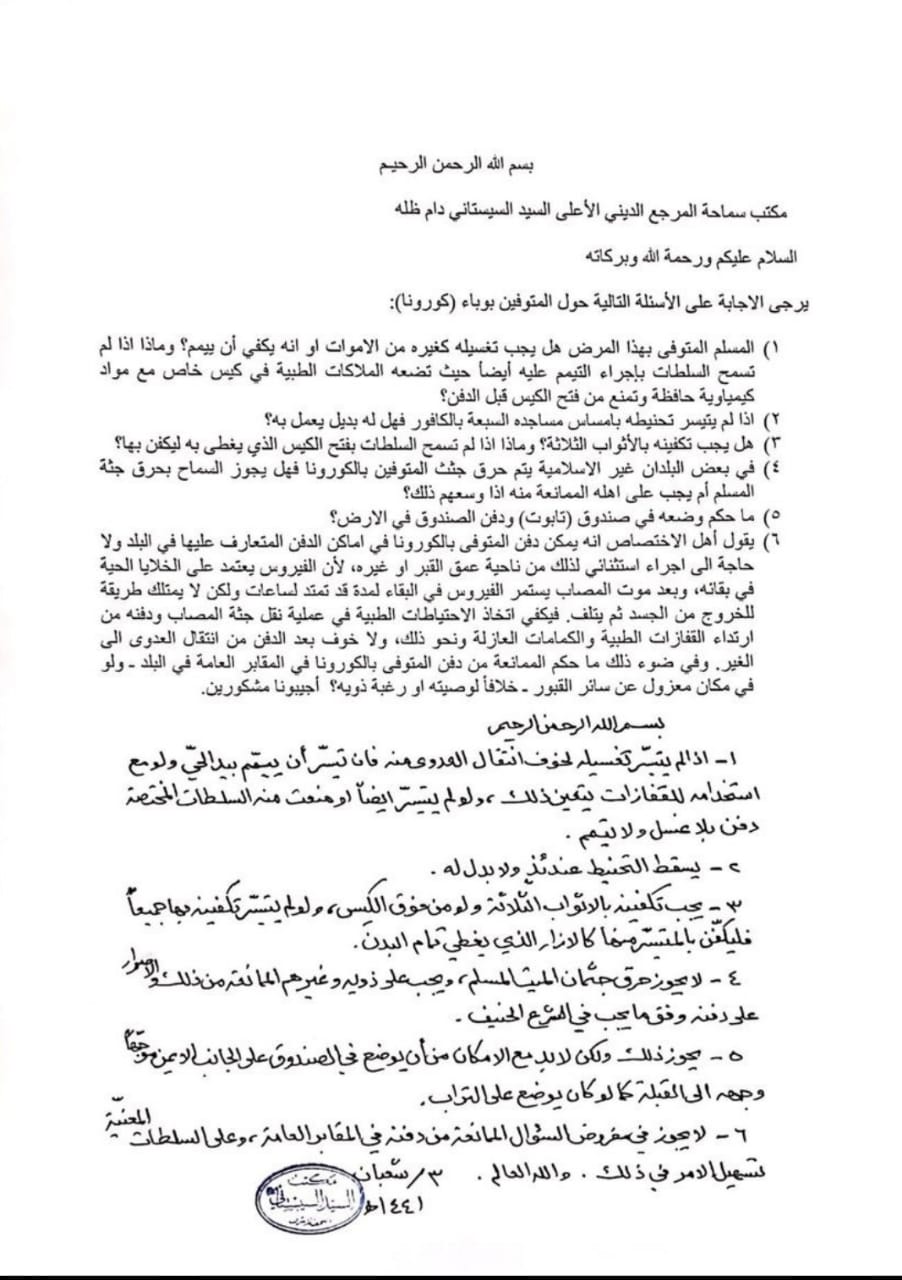Liaison office of Grand Ayatullah Sayyid Ali Al Sistani (L.M.H.L) in London, Europe, North and South America.

- Fatwa
- 3 Shabban 1441
Questions about Preparing the Bodies of Those Deceased From CoronaVirus (COVID-19)
In The Name of Allah The Beneficent The Merciful
To the office of the Grand Religious Authority Al-Sayed Al-Sistani (may Allah prolong his life).
Assalamu ‘alykum wa rahmatu'llahi wa barakatuh,
We ask of you to please answer the following questions regarding those who have died from the corona pandemic:
1. Is ghusl mandatory for the Muslim who passes away from this pandemic, or is tayammum sufficient? What do we do if the authorities do not allow tayammum for the deceased, because they place the body in a special body bag that contains chemical preservatives and prohibit opening the bag before burial?
2. If tahneet of the deceased by wiping their seven masajid with camphor cannot be done, is there an alternative?
3. Is it mandatory to enshroud the deceased with the three pieces of cloth ? And what if the authorities do not allow the opening of the body bag for enshrouding?
4. In some countries, non-Muslims cremate the bodies of those who have died from the corona virus; is it permissible to allow them to cremate a Muslim's body, or if able, is it obligatory that the family of the deceased prevent them from doing so?
5. What is the ruling for placing the dead body in a coffin and burying the coffin in the ground?
6. The experts say that one can bury victims of the corona virus in a regular cemetery without any special criteria in terms of the depth of the grave and so forth. This is because the virus is sustained by living cells, after the death of its host, the virus will remain for a few hours but does not have any means to leave the host body, which leads to its eventual dissolution. Therefore, it is sufficient to take the necessary medical precautions such as wearing medical gloves and a mask and so forth during the transportation and burial of the infected body. After the burial is complete, the body will no longer be contagious. Based on this information, what is the ruling if prevention of burial in a regular cemetery contradicts the will of the deceased and his family, even if the grave is isolated from other graves?
We would appreciate your response.
Ghusl Al-Mayyit is the ritual wash of the body of a deceased person.
Tahneet is the process of wiping camphor on the seven masajid.
The seven masajid are the areas of the body that come in contact with the ground while in prostration: forehead, both palms of the hands, both knees, and both big toes.
The three cloths are the: qamees(shirt), mi'zar(loin cloth) and izar(full body cloth).
In The Name of Allah The Beneficent The Merciful
1. If the deceased cannot be washed for fear of being contagious, then, if possible, tayammum should be done using the hands of the person who would normally be washing the deceased, even if one uses gloves to do so . However, if this is not possible, or the authorities do not allow it, then burial is done without ghusl or tayammum.
2. In such a case, tahneet is not required and there is no substitute.
3. Enshrouding with the three cloths is mandatory, even if it is done over the body bag. If it is not possible to place all three cloths, then however many can be placed would be required, such as the izar which covers the entire body.
4. It is not permissible to cremate a deceased Muslim. It is obligatory on his family and others to prevent this from happening and they must insist on a burial based on Islamic law.
5. It is permissible. However, he must be placed on his right side in the coffin facing the qiblah as though he was being placed on the soil of the ground.
6. Based on what is mentioned in the question, it is not permissible to prevent his burial in a regular cemetery and it is the responsibility of the authorities to ease this process and Allah knows best.
The Office of Al-Sayed Al-Sistani
The Holy City of Najaf
Sha'ban 3, 1441 A.H.
The person helping the deceased do tayammum must wear gloves themselves to prevent infection.
Direction of Makkah.
